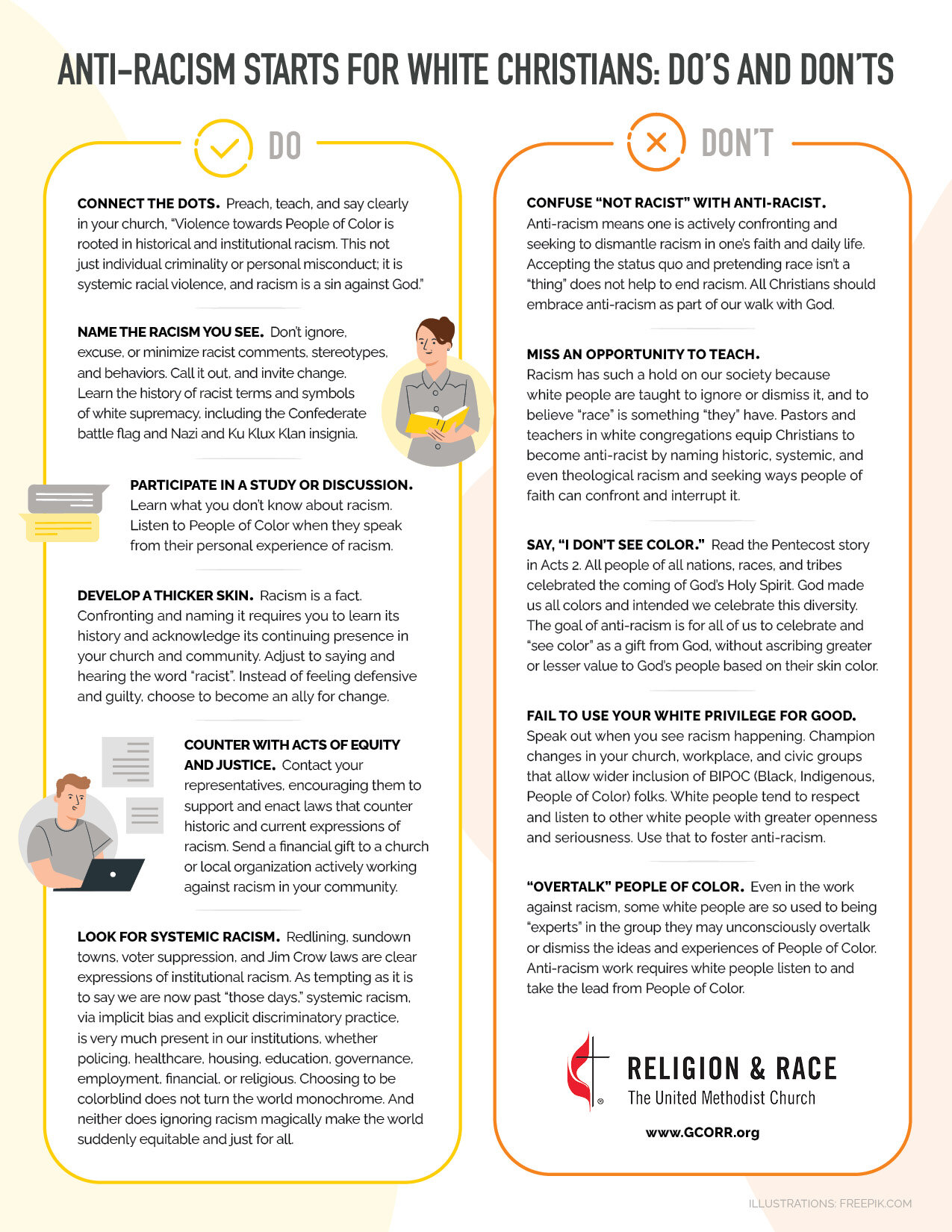Anti-Racism Starts: Do’s and Don’ts
Below the graphic you’ll find a full readout of the text it contains. This helps aid accessibility, particular for those using screen-reading software.
Anti-Racism Starts for White Christians: Do’s and Don’ts
Do –
Connect the dots. Preach, teach, and say clearly in your church, “What is happening is rooted in systemic, historical, institutional racism. This is not just politics; it is racial violence, and racism is a sin against God.”
Name the racism you see. Those who attacked the U.S. Capitol Building and protested election results in other state capitals wore Nazi and Ku Klux Klan insignia; they waved nooses and the Confederate battle flag, all of which are long-revered symbols of white supremacy and racist violence. Learn that history.
Participate in a study or discussion. Learn what you don’t know about racism. Listen to People of Color when they speak from their personal experience of racism.
Develop a thicker skin. Racism is a fact. Confronting and naming it requires you to learn its history and acknowledge its continuing presence in your church and community. Adjust to saying and hearing the word “racist”. Instead of feeling defensive and guilty, choose to become an ally for change.
Counter with acts of equity and justice. Contact your representatives, encouraging them to support and enact laws that counter historic and current expressions of racism. Send a financial gift to a church or local organization actively working against racism in your community.
Look for systemic racism. Peaceful demonstrations led by Black activists have been met with aggressive tactics from a visibly-militarized police, while far-right demonstrators who broke through barricades, windows, and doors of the Capitol Building were able to do so without much resistance from law-enforcement. This is an example of systemic racism in our policing practices and proportionality of response.
Don’t –
Confuse “not racist” with anti-racist. Anti-racism means one is actively confronting and seeking to dismantle racism in one’s faith and daily life. Accepting the status quo and pretending race isn’t a “thing” does not help to end racism. All Christians should embrace anti-racism as part of our walk with God.
Miss an opportunity to teach. Racism has such a hold on our society because white people are taught to ignore or dismiss it, and to believe “race” is something “they” have. Pastors and teachers in white congregations equip Christians to become anti-racist by naming historic, systemic, and even theological racism and seeking ways people of faith can confront and interrupt it.
Say, “I don’t see color.” Read the Pentecost story in Acts 2. All people of all nations, races, and tribes celebrated the coming of God’s Holy Spirit. God made us all colors and intended we celebrate this diversity. The goal of anti-racism is for all of us to celebrate and “see color” as a gift from God, without ascribing greater or lesser value to God’s people based on their skin color.
Fail to use your white privilege for good. Speak out when you see racism happening. Champion changes in your church, workplace, and civic groups that allow wider inclusion of BIPOC (Black, Indigenous, People of Color) folks. White people tend to respect and listen to other white people with greater openness and seriousness. Use that to foster anti-racism.
“Overtalk” People of Color. Even in the work against racism, some white people are so used to being “experts” in the group they may unconsciously overtalk or dismiss the ideas and experiences of People of Color. Anti-racism work requires white people listen to and take the lead from People of Color.

